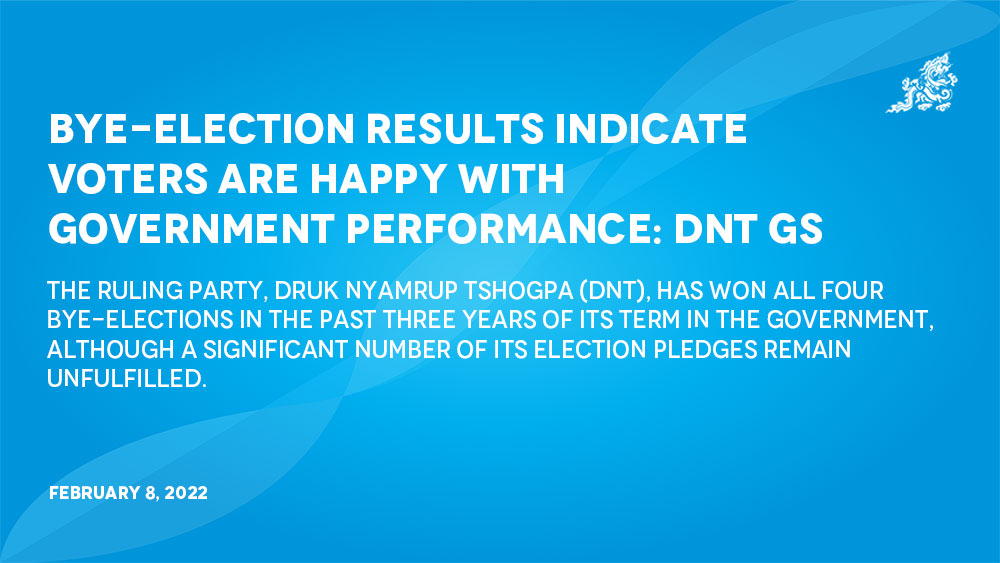MB Subba
The ruling party, Druk Nyamrup Tshogpa (DNT), has won all four bye-elections in the past three years of its term in the government, although a significant number of its election pledges remain unfulfilled.
The number of ruling MPs has increased to 33 with DNT’s Karma Gyeltshen, 53, winning the Khamdang-Ramjar bye-election in Trashiyangtse on February 3.
The Opposition Party, Druk Phuensum Tshogpa (DPT), has been reduced to 14 MPs.
DNT’s Karma Gyeltshen won by a comfortable margin of 1,043 votes against DPT’s candidate, Jigme Tashi, 34.
According to observers, people voted for the ruling party although it has less than two years to work on its pledges.
Most attribute the DNT’s win to the ruling party factor.
The MP-elect, Karma Gyeltshen, said that he was confident of winning the bye-election as he had maintained close contact with voters.
It was his third attempt, as he had contested as a National Council candidate in 2013 and DNT candidate in 2018.
He said that he had been genuine in making the pledges and that they are doable.
Karma Gyeltshen said that Trashiyangtse was one of the least affected dzongkhags by Covid-19 and that the constituency could make use of the local manpower to execute the work projects.
“We need not import workers to implement the work.
My pledges include improvement of existing roads and construction of new ones,” he said.
His pledges include constructing a farm road from Thragom gewog centre via Bumchang and Rolam to Melongkhar BHU.
The DNT general secretary, Phurba, said people had voted for DNT mainly because of the ruling party factor and the capability of the candidate.
He said that DNT had been fielding seasoned candidates in all the bye-elections. “The bye-election results indicate that most people were satisfied with the government’s performance.”
He also claimed that it’s an indication that people will support the party in the upcoming parliamentary elections.
However, a DPT official attributed the election loss to a low voter turnout. He said that many of those who did not vote in the bye-election were DPT supporters.
He said that the Opposition Party was still strong on the ground and that unlike in bye-elections, more voters would cast their votes during the primaries and the general elections.
The voter turnout was 52.21 percent, while the number of the total registered voters was 10,075, according to the Election Commission. That means only 5,261 voters cast their votes.
The postal votes outnumbered those cast by electronic voting machine (EVM).
Only 2,374 or 23 percent of the registered voters cast their votes on EVM, while 2,805 voted via postal ballots.
A People’s Democratic Party (PDP) member said that many people hope that they would benefit more by voting for the ruling party.
He, however, added that he did not see the current ruling party as a strong contender for his party in the upcoming parliamentary elections.
He said that not much had happened in the past three years in terms of developmental activities and good governance. “People are wise enough to make the right decision when the parliamentary elections come.”
Meanwhile, a female voter from Khamdang said it is important to have a strong opposition in Parliament. “But the ruling party has the upper hand when it comes to bringing development activities in the constituencies.”
However, an observer said that there is not much time left for the government to implement pledges amid the pandemic.
He said that the voters must have voted based on the candidates, not on party lines.


